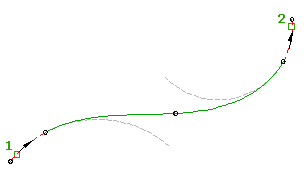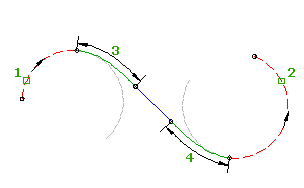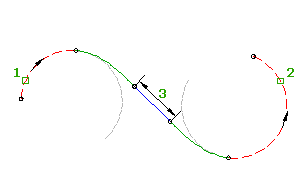To add a free reverse transition-transition (between two curves)
Add a free reverse transition-transition group between two curves that are in different directions.
The two transitions bend in opposite directions. Transition parameters and attachment points are automatically calculated. If either of the attachment curves (1, 2) are edited, the transition-transition group maintains tangency.

By default, the two transitions have equal lengths and A values. Both values can be modified at the time of creation by specifying a ratio of A1/A2 or L1/L2.
- Click the alignment. Click

 Find.
Find. - On the Alignment Layout Tools toolbar, click
 Free Reverse Transition-Transition (Between Two Curves).
Free Reverse Transition-Transition (Between Two Curves). The current transition definition is displayed at the command line. For more information about changing the default transition definition, see To Work With Curve and Transition Settings for Alignments.
- Specify the element before and the element after to which you want to add the transition.
- Optionally, enter a value for the ratio of A1 to A2, or select Length and enter a value for the ratio of L1 to L2. Otherwise, the A values and lengths of each transition will be equal. Note: If the curves are in the same direction, a compound solution is given. Enter Yes at the command line to accept the solution, or enter No to restart the command. There is no solution if the curves cross, or for concentric curves.
To add a free reverse transition-line-transition (between two curves, transition lengths)
Add a free reverse transition-line-transition group, with specified transition lengths, between two curves.
The two transitions bend in opposite directions. You specify the transition lengths (2, 3). The line length is automatically calculated. If either of the attachment curves (1, 2) are edited, the transition lengths do not change.

In this command you can specify the transition parameters, but not the line length. Line length is calculated automatically.
- Click the alignment. Click

 Find.
Find. - On the Alignment Layout Tools toolbar, click
 Free Reverse Transition-Line-Transition (Between Two Curves, Transition Lengths).
Free Reverse Transition-Line-Transition (Between Two Curves, Transition Lengths). The current transition definition is displayed at the command line. For more information about changing the default transition definition, see To Work With Curve and Transition Settings for Alignments.
- Specify the element before and the element after to which you want to add the transition.
- Specify either the length or the A value for the transition in and the transition out.
Specify a new value, or press Enter to accept the value that is displayed on the command line.
- If the alignment has design criteria applied to it, the minimum value for the current design speed is displayed.
- If the alignment does not have design criteria applied to it, the default value specified in the curve and transition settings is displayed.
Note: If the curves are in the same direction, a compound solution is given. Enter Yes at the command line to accept the solution, or enter No to restart the command. There is no solution for concentric curves.
To add a free reverse transition-line-transition (between two curves, line length)
Add a free reverse transition-line-transition group, with a specified line length, between two curves.
The two transitions bend in opposite directions. You specify the line length (3). The transition lengths are automatically calculated. If either of the attachment curves (1, 2) are edited, the line length does not change.

- Click the alignment. Click

 Find.
Find. - On the Alignment Layout Tools toolbar, click
 Free Reverse Transition-Line-Transition (Between Two Curves, Line Length).
Free Reverse Transition-Line-Transition (Between Two Curves, Line Length). The current transition definition is displayed at the command line. For more information about changing the default transition definition, see To Work With Curve and Transition Settings for Alignments.
- Specify the element before and the element after to which you want to add the transition.
- Specify the line length.